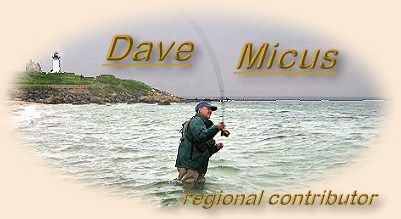|
Recently the weather in my little corner
of Massachusetts has been more like November
than June, and while this hasn't stopped me
from fishing, it has stopped me from fishing
from the kayak. I like to use the yak to
reach places otherwise inaccessible, beach
the boat and get out and fish, which means
wet wading and warm water (warm being relative;
what is warm to a New Englander would be a
cold drink to a southerner). Cold water
requires wearing waders in the yak which I
really don't like to do. The boots are bulky,
it's uncomfortable to paddle, and I don't
think there is a PFD made that would keep me
afloat if I tipped the yak and flooded my
stocking foots. So I've had to pass on
fishing from the yak.
But last week, in typical New England fashion,
there was a 30 degree temperature swing, and
the water even warmed to 60, perfect for the
first shake-down cruise. I take a short
preliminary voyage on Friday evening, what I
thought would be a dry run, a brief paddle to
the marsh bank in front of my house a few
hundred yards offshore. Of course I bring the
fly rod along, being a firm believer in "better
to have a fly rod and not need it..." and it's
this philosophy that keeps one rod strung up
by the basement door, and a multi-piece travel
rod in the trunk of my car (a dangerous practice
that has resulted in more than one last minute
"sick" day from work). I really don't expect
to catch anything today, but luckily I'm wrong.
In the brief half-hour fishing from the bank
I manage to hook three fish, one of which is
a decent sized bass.

The real shake down cruise will be the following
day. My favorite time to fish, two hours before
low tide, is at 5 am, and I resolve to get up
early and get out in the yak. There's no need
to set the alarm for fishing (quite the opposite
for work) and I'm out on Plum Island Sound by
4:45, paddling to a favorite spot. Fishing is
never a sure thing, but some spots are dependable
and this is one of those, a sand beach on the
marsh at the confluence of three estuarine
streams that is inaccessible except by boat.
I beach the yak on the sand beach, walk against
the direction of the tide to one end of the beach
and fish with the tide back to the other end.
In just a few casts I land my first striper, a
healthy fish in the high teens and a harbinger
of the fishing to come.

It's impossible to explain the allure of
fishing to those who don't fish, and no
need to explain it to those who do. There
are those times on the water where you get
the feeling that everything is not only
right with you but right with the world,
what Abraham Maslow called a Peak Experience,
and this is one of those times. Before the
day is through I'll catch and release 42 bass,
all small except for three, but early in the
year, after a long winter of no fishing,
quantity equals quality. Later in the season
I'll leave schools of fish like this, ignoring
the "never leave fish to find fish" adage in
the hopes of finding bigger bass. You'll hear
apocryphal tales of large bass feeding beneath
the small schools, but I've never found that
to be the case. Small fish avoid big fish for
obvious reasons, and big stripers don't get to
be cows by eating the table scraps of schoolies
(though sometimes the larger fish follow the
smaller fish in waves with the tide, and you
will see a steady progression, first catching
small bass, then a pause, then fish a bit larger,
then a pause, and then large fish, as if school
is letting out and the lesser grades are released
first).

Today, though, I just enjoy myself with these
smaller fish, practicing those little tricks
that sometimes make the difference between
catching and not catching, like wiggling the
rod during the last 30 feet of the retrieve
to imitate a bait fish frantically trying to
get away which often triggers a strike from
a reticent stripper. On a short strike close
to shore I use a trick that North Shore striper
bum Mike Tolvanen taught me--quickly pick up
the line and cast to that spot three times,
slapping the water with the fly each time to
attract the fish, letting the fly sink on the
third cast and the bass engulfs the fly.
After fishing for four hours, I reel in and
leave. It's nine o'clock and the yahoos in
their high powered boats are just starting
to appear, racing through the water at excessive
speeds and hell-bent on getting God-knows-where
in a hurry, always my queue to call it a day.
But before I launch I stand on the beach and
look out on the water, and something catches
my eye. A bit off shore the water is nervous,
electric, and as I watch a school of bass begins
to bust bait on the surface. It's a small school
and the blitz ends quickly, but, like the first
dusting of snow to the avid skier, it's a pleasing
portent of things to come.

I push the kayak off the beach and paddle
against the current, careful not to hook
the lobster pot buoys as I troll a fly,
almost tasting that first cup of hot coffee
that will be my reward when I get home. ~ Dave
About Dave:
 Dave Micus lives in Ipswich, Massachusetts. He is an
avid striped bass fly fisherman, writer and instructor.
He writes a fly fishing column for the Port City Planet
newspaper of Newburyport, MA (home of Plum Island and Joppa Flats)
and teaches a fly fishing course at Boston University.
Dave Micus lives in Ipswich, Massachusetts. He is an
avid striped bass fly fisherman, writer and instructor.
He writes a fly fishing column for the Port City Planet
newspaper of Newburyport, MA (home of Plum Island and Joppa Flats)
and teaches a fly fishing course at Boston University.
|











